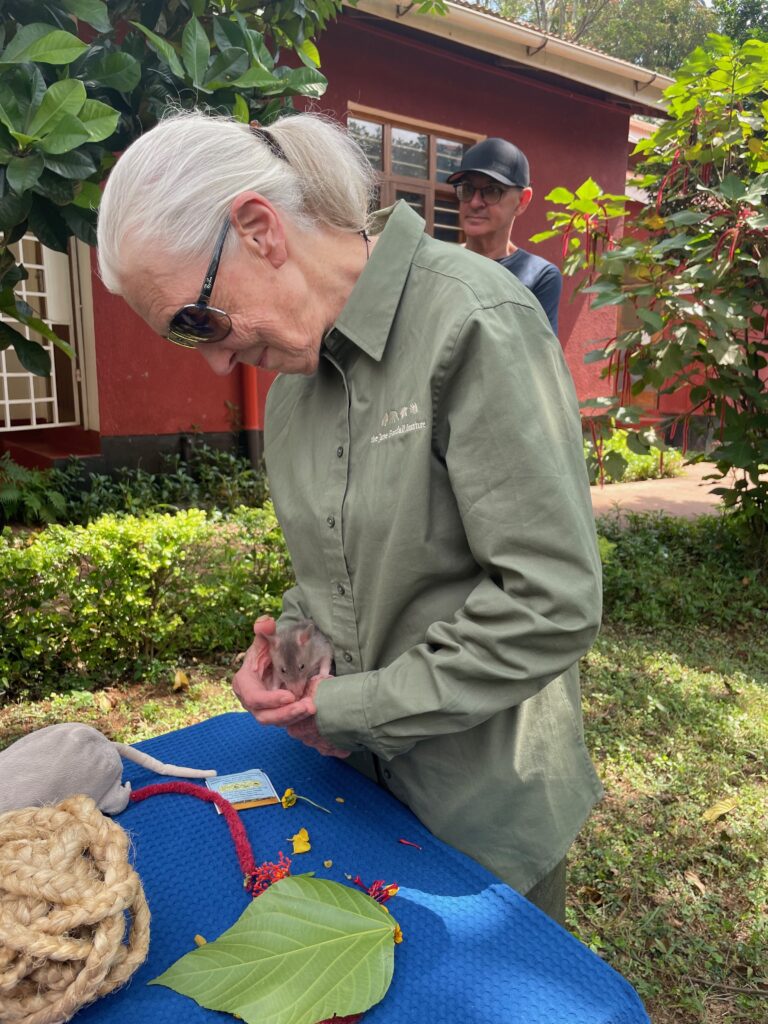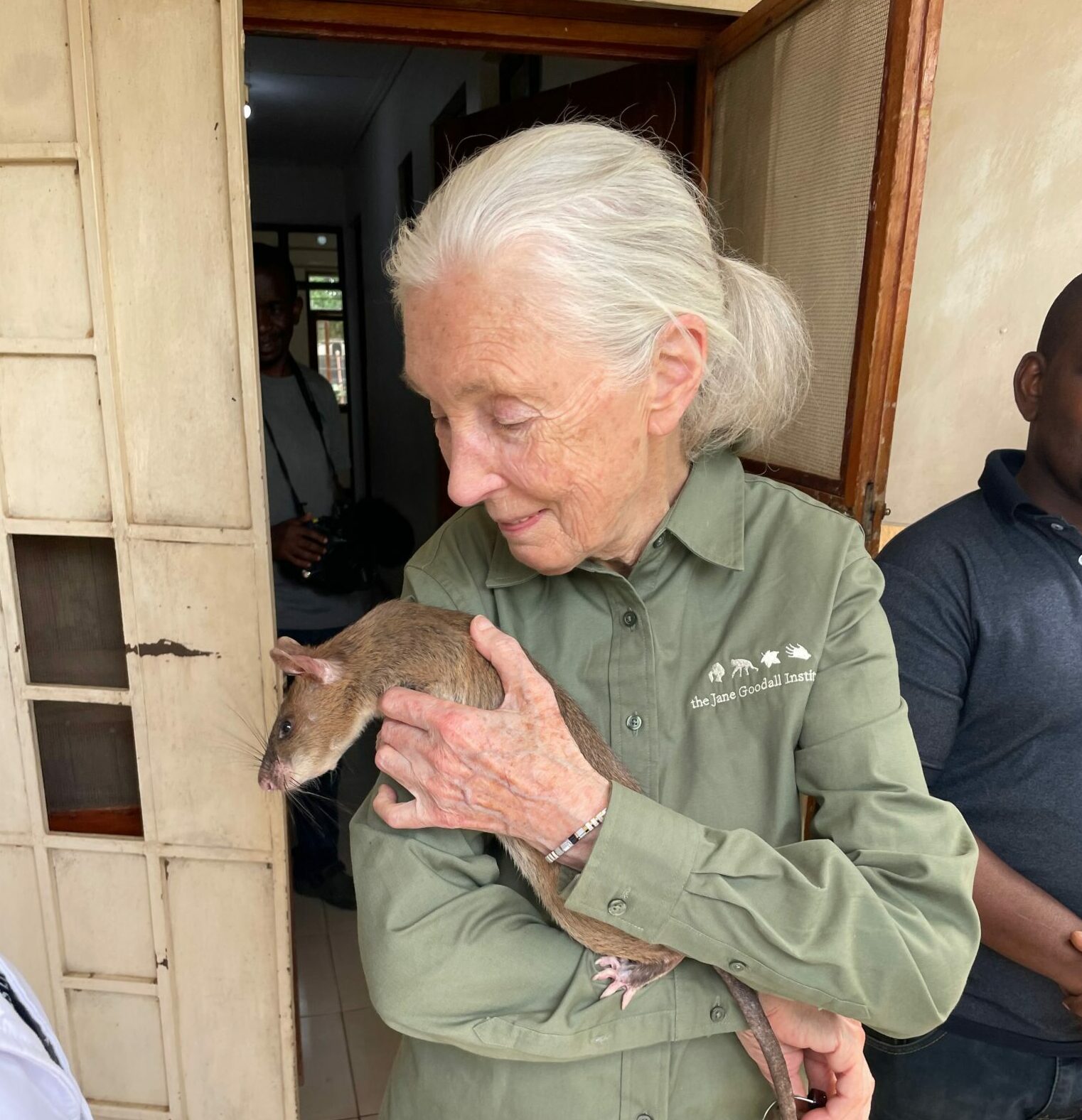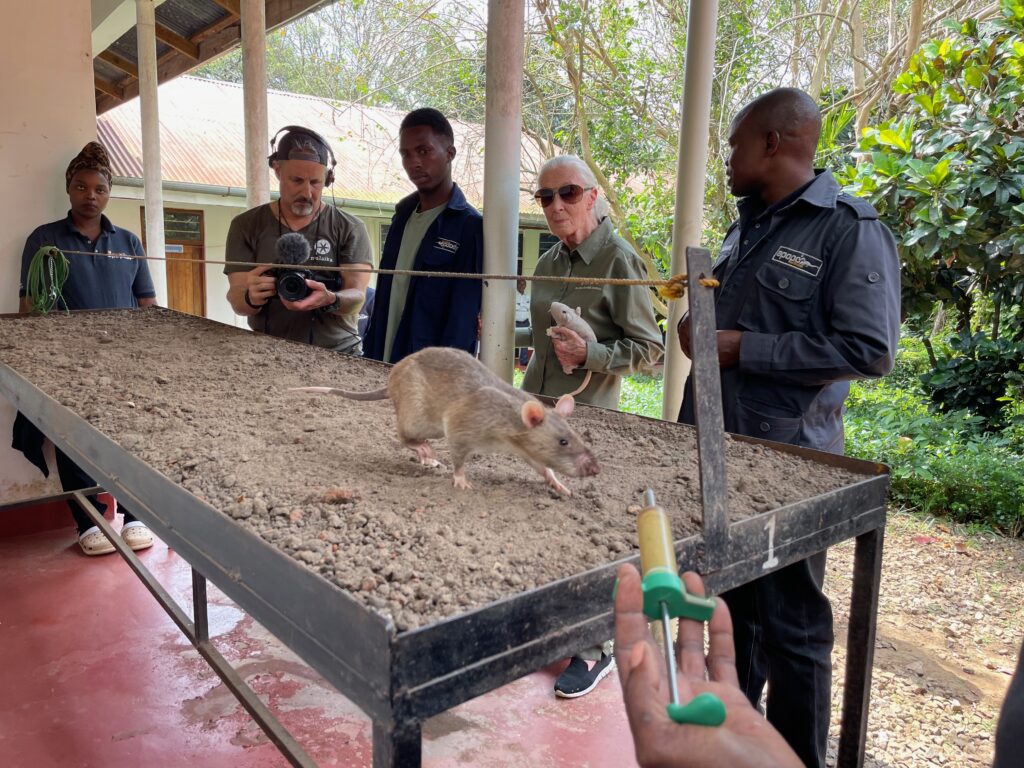APOPO was honored to welcome Dr. Jane Goodall back to our operational headquarters in Morogoro, Tanzania, for a visit that rekindled the connection she established with us in 2005. The visit, which was part of a broader project to produce a documentary film about her life, her current endeavors and work in Tanzania, highlighted the continued importance of APOPO’s work and the inspiring contributions of our HeroRATs.
Dr. Jane Goodall is a renowned primatologist, ethologist, and anthropologist, best known for her groundbreaking studies on chimpanzee behavior in Gombe Stream National Park, Tanzania. Starting her research in 1960 under the mentorship of Louis Leakey, she revolutionized the understanding of chimpanzees, including tool use and hunting behaviors previously thought to be exclusive to humans.
Beyond her scientific contributions, Jane Goodall has become a global advocate for wildlife conservation, animal welfare, and environmental sustainability. She founded the Jane Goodall Institute in 1977, which supports research and conservation programs worldwide, and the Roots & Shoots program, which empowers young people to engage in environmental and humanitarian efforts. Throughout her career, Goodall has authored numerous books and received multiple honors, including being named a United Nations Messenger of Peace in 2002.

A Day of Demonstrations and Interactions with the HeroRATs
During her visit, Dr. Goodall witnessed firsthand the innovative and impactful work being done at APOPO. She watched demonstrations of the various training programs, including landmine detection, tuberculosis detection, search and rescue, and wildlife detection. These demonstrations provided a thorough overview of the extensive training that the HeroRATs require to perform their life-saving tasks.
One particularly heartwarming moment occurred when a young HeroRAT pup fell asleep in Dr. Goodall’s hands. In a gesture of admiration and affection, the team decided to name the little one Jane.
Dr. Jane Goodall expressed her admiration for the HeroRATs and the work the APOPO team does: “First of all I want to thank you for giving us such a wonderful visit. My group, who had not seen the HeroRATs before, were amazed. I had seen them before doing mine and TB detection – but not search and rescue or detecting illegal wildlife. Honestly, these rats are incredible.”
APOPO’s Wildlife Detection Project Resonates with Dr. Goodall’s Mission
Dr. Goodall was particularly inspired by APOPO’s Wildlife Detection Project given her particular passion for wildlife conservation. Although it is still in the research phase, the project focuses on training a team of HeroRATs to detect illegally trafficked wildlife products such as pangolin scales.
In partnership with the Endangered Wildlife Trust (EWT) of South Africa, APOPO has been developing this project over recent years and in 2023 ran trials in close collaboration with the Tanzania Wildlife Management Authority (TAWA) and the seaport’s Joint Port Control Unit (JPCU). Using the extraordinary olfactory capabilities of our African giant pouched rats (Cricetomys ansorgei), also known as HeroRATs, APOPO aims to improve the screening process for detecting a range of commonly trafficked wildlife products.
The HeroRATs are well-suited for this task due to their incredible sense of smell and ability to navigate complex environments. Dr. Goodall noted that the HeroRATs’ ability to detect illegal wildlife products could play a crucial role in disrupting the illegal wildlife trade.
HeroRATs: APOPO’s Unique Approach to Solving Global Challenges
APOPO’s unique approach to solving global issues using trained rats has garnered international attention and acclaim. The HeroRATs, trained in scent detection, play a critical role in identifying landmines and tuberculosis, significantly contributing to public health and safety. The addition of search and rescue and wildlife detection further expands the potential impact of APOPO’s work.
Dr. Goodall’s visit was a reminder of the importance of innovative solutions in addressing global challenges. Her presence and endorsement reinforce the value of APOPO’s mission and inspire continued efforts towards making the world a safer and healthier place.
Recognizing Dr. Goodall’s Enduring Impact and Her Support for APOPO
APOPO extends its heartfelt gratitude to Dr. Jane Goodall and the Jane Goodall Institute for their support and dedication to creating positive change. Her visit highlighted the important APOPO does and her many years of work in science and conservation are a huge inspiration for the entire team. As APOPO continues to grow and evolve, the support and recognition from esteemed individuals like Dr. Goodall is invaluable in driving our mission forward.
About Jane Goodall
Jane Goodall’s Legacy: From Chimpanzees to Global Conservation
Dr. Jane Goodall (born: Valerie Jane Morris-Goodall) is a renowned primatologist and anthropologist, best known for her groundbreaking research on wild chimpanzee behavior in Gombe Stream National Park, on the eastern shore of Lake Tanganyika, Tanzania. Additionally, she forged a path for women in science and is recognized as a pioneer in animal research and conservation.
Her work revolutionized the scientific understanding of primates and highlighted the close behavioral and genetic relationships between humans and chimpanzees. She received a Doctorate in ethology from the University of Cambridge in 1965 and was only the eighth person in the university’s history to be allowed to pursue a Ph.D. without first earning an undergraduate degree.
Her work became widely known following a National Geographic television documentary aired in 1965 and her follow-up book ‘My friends, the Wild Chimpanzees,’ also published by National Geographic.
Dr. Goodall’s work in Gombe Stream National Park also shed light on the intricate social interactions and complex behaviors exhibited by chimpanzee communities. Her research also highlighted the close relationships between human behavior and genetics and that of wild chimpanzees, emphasizing the importance of conservation efforts and environmental protection.
Jane Goodall Challenged Previous Understanding of Chimpanzees
Jane Goodall‘s groundbreaking observations at Gombe Stream National Park challenged long-standing beliefs within the scientific community about chimpanzee behavior.
Firstly, her finding that chimpanzees are omnivores, not herbivores, shattered the misconception that they relied on a plant-based diet. She documented instances of chimpanzees hunting for meat, including small mammals and even other primates.
The second observation that Dr. Goodall made was that chimpanzees use tools. This behavior was once thought to be uniquely human. From using sticks to extract termites from mounds to using rocks as hammers to crack open nuts, she observed that chimpanzees demonstrated great ingenuity and problem-solving abilities. Additionally, they were found to pass these skills on to each other within each chimpanzee community.
Dr. Goodall’s third breakthrough observation was that wild chimpanzees displayed complex social behavior. She documented the intricate social structures of chimpanzee communities, including relationships, hierarchies, and behaviors such as grooming and alliance formation.
From Research to Activism
After a conference in Chicago in 1986 focusing on the ethical treatment of chimpanzees, she realized the urgent need to raise awareness and advocate for the protection of her beloved chimpanzees and their habitats, as well as the unethical treatment of chimpanzees used for research purposes.
Jane Goodall recognized that the wild chimpanzee population was rapidly declining due to habitat destruction, illegal hunting, and the pet trade. She understood the importance of addressing these issues to ensure the survival of the species and the preservation of their unique ecosystems.
The Jane Goodall Institute
One of Goodall’s most remarkable achievements was the establishment of the Jane Goodall Institute in 1977. The institute continues to carry forward her conservation mission, working to protect chimpanzees and their habitats, as well as promoting sustainable livelihoods for local communities.
Through the Jane Goodall Institute’s Roots & Shoots program, Goodall empowered young people to become agents of change in their communities and beyond. The program encourages youth to take action on environmental and social issues,
Jane Goodall’s Notable Awards and Prizes
Jane Goodall‘s dedication and contributions to the field of primatology and conservation have earned her numerous accolades and recognition throughout her career.
She was created Dame Commander of the Order of the British Empire (DBE) in 2003, allowing her to use the title of Dame Jane Goodall.
In 2021, she was awarded the prestigious Templeton Prize, honoring her lifelong commitment to exploring the relationship between natural science, spirituality, and human experience.
The following year, in 2022, Jane Goodall was honored with the Stephen Hawking Medal for Science Communication. This award, named after the renowned physicist Stephen Hawking, celebrates individuals who effectively communicate complex scientific concepts to the public.
Publications
Dr. Jane Goodall has authored numerous books throughout her career, spanning various aspects of her research, experiences, and advocacy. Here is a comprehensive list of her published books:
- “My Friends, the Wild Chimpanzees” (1967)
- An account of Jane Goodall‘s early observations and interactions with the chimpanzees of Gombe Stream National Park, capturing the complexities of their behavior and social structures.
- “In the Shadow of Man” (1971)
- An account of her early years studying chimpanzees in Gombe Stream National Park.
- “The Chimpanzees of Gombe: Patterns of Behavior” (1986)
- A detailed scientific account of her research on chimpanzees.
- “Through a Window: My Thirty Years with the Chimpanzees of Gombe” (1990)
- A Jane Goodall biography with insights and reflections from thirty years of chimpanzee community research.
- “Reason for Hope: A Spiritual Journey” (1999)
- An autobiographical work that explores her spiritual journey.
- “Africa in My Blood: An Autobiography in Letters” (2000)
- A collection of letters providing a personal glimpse into Jane Goodall‘s life and work.
- “Beyond Innocence: An Autobiography in Letters, The Later Years” (2001)
- A continuation of Jane Goodall‘s autobiography through letters from later years.
- “The Ten Trusts: What We Must Do to Care for The Animals We Love” (2002)
- Co-authored with Marc Bekoff, focusing on the ethical treatment of animals.
- “With Love: Ten Heartwarming Stories of Chimpanzees in the Wild” (2003)
- A children’s book in which Jane Goodall tells stories about individual chimpanzees she got to know during her time in the Gombe forest. Famous for the quote, “Every individual matters. Every individual has a role to play. Every individual makes a difference.”
- “Harvest for Hope: A Guide to Mindful Eating” (2005)
- A guide promoting sustainable and ethical eating habits.
- “Hope for Animals and Their World: How Endangered Species Are Being Rescued from the Brink” (2009)
- Stories of successful conservation efforts around the world.
- “Seeds of Hope: Wisdom and Wonder from the World of Plants” (2013)
- Co-authored with Gail Hudson, emphasizes the importance of plants and their conservation.
- “The Book of Hope: A Survival Guide for Trying Times” (2021)
- Co-authored with Douglas Abrams, offering practical advice for dealing with challenges.
- “The Chimpanzee Family Book” (1989)
- A children’s book that educates about chimpanzee families.
- “Pangolina” (2021)
- A children’s fiction book about the endangered pangolin.
- “The Eagle & the Wren” (2000)
- A children’s book with a moral story about teamwork.
- “Dr. White” (1999)
- A story about a dog that brings joy and healing.
- “Elephant Family” (2002)
- A children’s book exploring the life of elephants.


